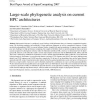Free Online Productivity Tools
i2Speak
i2Symbol
i2OCR
iTex2Img
iWeb2Print
iWeb2Shot
i2Type
iPdf2Split
iPdf2Merge
i2Bopomofo
i2Arabic
i2Style
i2Image
i2PDF
iLatex2Rtf
Sci2ools
114
Voted
SP
2008
IEEE
2008
IEEE
Large-scale phylogenetic analysis on current HPC architectures
Abstract. Phylogenetic inference is considered a grand challenge in Bioinformatics due to its immense computational requirements. The increasing popularity and availability of large multi-gene alignments as well as comprehensive datasets of single nucleotide polymorphisms (SNPs) in current biological studies, coupled with rapid accumulation of sequence data in general, pose new challenges for high performance computing. By example of RAxML, which is currently among the fastest and most accurate programs for phylogenetic inference under the Maximum Likelihood (ML) criterion, we demonstrate how the phylogenetic ML function can be efficiently scaled to current supercomputer architectures like the IBM BlueGene/L (BG/L) and SGI Altix. This is achieved by simultaneous exploitation of coarse- and fine-grained parallelism which is inherent to every ML-based biological analysis. Performance is assessed using datasets consisting of 270 sequences and 566,470 base pairs (haplotype map dataset), an...
Related Content
| Added | 15 Dec 2010 |
| Updated | 15 Dec 2010 |
| Type | Journal |
| Year | 2008 |
| Where | SP |
| Authors | Michael Ott, Jaroslaw Zola, Srinivas Aluru, Andrew D. Johnson, Daniel Janies, Alexandros Stamatakis |
Comments (0)

